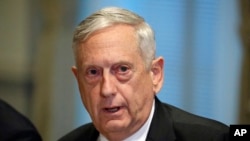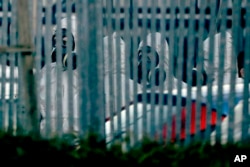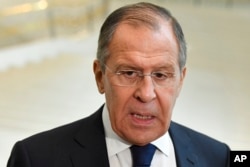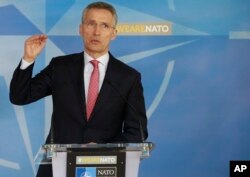The top U.S. defense official chastised Russia for dangerous and reckless behavior, saying it was "pretty obvious" Moscow was behind the use of a military-grade nerve agent against a former Russian spy and his daughter in Britain.
"Attempted murder of a man and his daughter. How's that for starters?" U.S. Defense Secretary Jim Mattis told reporters Tuesday at the Pentagon when asked to describe the incident that has since touched off a diplomatic backlash against Russia.
The White House said as of Tuesday, more than 25 countries had expelled 150 Russian intelligence officers "hiding under diplomatic cover" and that Washington hoped more nations would follow Washington's lead.
"We're certainly applying pressure on Russia. We're certainly encouraging and working with our allies and partners also to do so," Press Secretary Sarah Sanders said, calling the number of countries taking a stand against Russia's actions "unprecedented."
The comments from both the Pentagon and the White House followed action from NATO earlier Tuesday, which announced it is expelling seven Russian diplomats and denying accreditation to three others as part of a "broad, strong and coordinated" international response.
"This will send a clear message to Russia that there are costs and consequences for their unacceptable pattern of behavior," NATO Secretary General Jens Stoltenberg said.
The U.S. on Monday, ordered 60 Russian diplomats accused of being spies to leave the country within a week and ordered the closure, by April 2, of Russia's consulate in the Pacific port city of Seattle in the state of Washington.
Russia has denied any involvement in the attack in Salisbury earlier this month that left Sergei Skripal and his daughter, Yulia, unconscious, and exposed hundreds of others to a nerve agent linked to Russia.
Russian Foreign Minister Sergey Lavrov said Moscow would respond to the U.S.-led moves within a week, described the expulsion of his countries diplomats from Western countries as, "Boorish anti-Russian behavior" and said colossal blackmail, "is now unfortunately the main tool of Washington on the international arena."
Russia's Ambassador to Australia Grigory Logvinov added Wednesday that if Western countries continue actions against Russia, then the world would be "deeply in a Cold War situation."
But U.S. Defense Secretary Jim Mattis, who said he was involved in the decision-making process that led to the expulsions, placed the blame on Russia, saying Moscow's decisions have left the West with little choice.
"Russia has chosen to be a strategic competitor even to the point of reckless acts," Mattis said, noting a mechanism designed to enable cooperation between Washington and Moscow, "regrettably, by Russia's choice, is a thing of the past."
"They're trying to break the unity of the Western alliance, NATO," he added. "I think we have to show where all of these democracies stand together. I think that's the statement about how you get to [Russian President Vladimir] Putin."
NATO officials also emphasized that despite the need to send a clear message to Moscow, it would not forego opportunities to establish a better relationship with Russia.
"We are not changing our approach to Russia, which is still based on a dual- tract approach, meaning strong deterrence, defense, and dialogue," NATO Secretary General Jens Stoltenberg told reporters. "We will continue to work for a meaningful political dialogue with Russia."
Still, there are doubts that ties between Russia and the West can be mended anytime soon, even with the recent suggestion from U.S. President Donald Trump that he and Russian President Putin could meet in the foreseeable future.
"Unfortunately, U.S.-Russia relations have already been at a very, very low point," the U.S. Special Representative for Ukraine, Kurt Volker, told VOA's Ukrainian service Tuesday, saying he expects Moscow to retaliate by expelling more Western diplomats.
WATCH: NATO expels Russian diplomats
"One hopes that we would be able to work together with Russia to resolve some issues,' he added. "But it's going to be based on Russia realizing that the actions it's taking are unacceptable and have gone too far."
There also have been suggestions that the West may still get even tougher on Russia.
"I personally think an even tougher response is still justified, including some of the targeted sanctions on the big oligarchs that are close to Putin to show that those who support a system that sponsors aggression of this kind will pay an increasing price, if this keeps going," Alexander Vershbow, a former U.S. Ambassador to Russia, who is now with the Washington-based Atlantic Council, told VOA.









